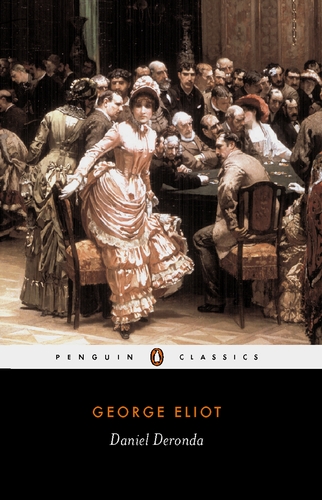This is a repeating event- Event 7 / 826 February 2024 5:00 pm11 March 2024 5:00 pm
George Eliot's Daniel Deronda
Event Details
Daniel Deronda, George Eliot’s controversial last published novel, combines two
Event Details

Daniel Deronda, George Eliot’s controversial last published novel, combines two major narrative strands in an ambitious book by a writer at the height of her powers. The first strand tells the story of Gwendolen Harleth, a beautiful, spirited woman, as she marries a member of the English ruling class. In agonisingly precise detail that continues to resonate with modern readers, Eliot explores the subordination of women and their shockingly ruthless exploitation by men.
The second strand follows the experiences of Daniel Deronda, an unusually sensitive young man, brought up as an upper-class Englishman but troubled by doubts as to his parentage and true identity. These strands intersect as both characters, in different ways, make deep discoveries about themselves. Eliot spins a web of images, motifs and subtle allusions to help us trace complex parallels between the two, but the second strand has never been as well received, most notoriously by F R Leavis, who went as far as to suggest that its excision would leave a great novel without distractions.
There are perhaps two important reasons for this negative response. As part of her critique of English attitudes, Eliot tries to counter a certain arrogance, even contempt, on the part of the upper classes towards Jews and oriental races. With close friends in the Jewish community, she had made her own scholarly study of its history and customs and was so repelled by her fellow countrymen’s attitudes and ignorance that she devoted a large part of her novel to trying to remedy this, making a plea for greater understanding and tolerance. She was aware of taking a risk and wrote ‘The Jewish element seems to me likely to satisfy nobody’. A second reason concerns the characterisation of Daniel, frequently dismissed as unconvincing. Here again, Eliot demonstrated daring, describing her character as having ‘perhaps more than a woman’s acuteness of compassion’ and as being able to explore the ‘unmapped country within us’. For the English upper class, a man with somewhat feminine aspects, a penchant for digging deep into the human psyche and an unusual openness to other societies would never be an obvious role model.
It is then no surprise that ‘taking a gamble’ is a recurring theme of the book. At the end of her career, Eliot was bravely exploring and exemplifying this aspect of life, challenging the conventions of contemporary affluent society and using all her literary skills to create a stunning artistic experience which retains its power to the present day. Familiar features of melodrama and romance mingle with innovatory techniques which would later become established in the works of modernist writers. In her final novel, she was still exploring, out on the edge . . . Will you take a gamble and sign on for this Salon study?
STUDY DETAILS:
- Eight-week study facilitated by Keith Fosbrook and Sarah Snoxall
- Monday evenings, 5.00-7.00 pm (UK), 22 January to 11 March 2024
- £280 for 8 meetings
- Recommended edition: Daniel Deronda by George Eliot, Penguin Classics, ISBN: 9780140434279
Time
(Monday) 5:00 pm - 7:00 pm(GMT+00:00)
Location
VIRTUAL - VIA ZOOM
